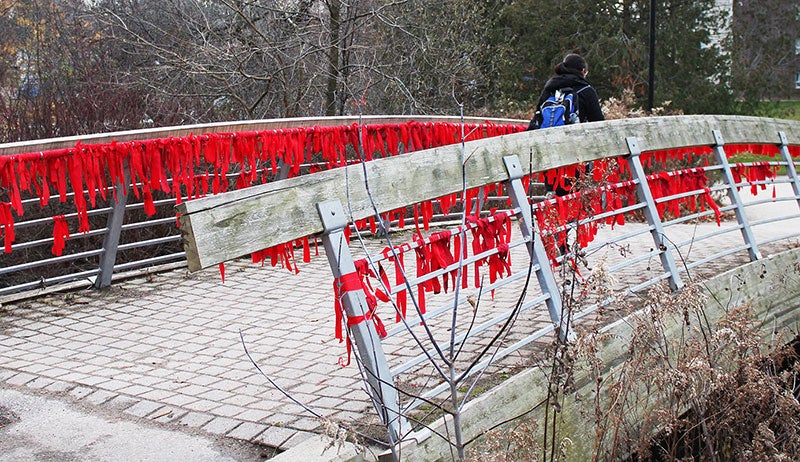Since
2016,
Bridge:
Honouring
the
Lives
of
Missing
and
Murdered
Indigenous
Women,
Girls,
and
Two
Spirit
Peoplehas
become
an
annual
installation
for
16
Days
of
Activism
Against
Gender-Based
Violence
at
the
University
of
Waterloo.
Opening Ceremony: Monday, November 25 at 10:30 am – 11:00 am; starting with a sacred fire ceremony to burn the ties from the previous year. The installation of the red ties for this year will be ongoing throughout the opening day (to 4pm) and over the course of the 16 Days. Closing Ceremony and De-installation takes place on Wednesday, December 11.

Working collaboratively with the Waterloo Indigenous Student Centre (WISC) Sorouja Moll, Ph.D initiated Bridge from the Writing Names Project (Montreal, 2009). The work creates a space for all University community members to learn about the crisis as they reflect upon their responsibilities, positionality, and advocacy, as individuals write a name on red fabric, and tie it to the bridge between Environment 3 and St. Paul's University College. Following scholar Sarah Stillman’s (2007) approach to media activism the work engages the ‘diagnostic’ to provide a cultural vocabulary (naming) that resists erasure generated from media bias, colonial policies, and dehumanized statistics; the ‘theatrical’ revives disenfranchised lives in the public imagination; and the ‘archaeological’ to dig proactively for the human stories that have been buried beyond the margins (491). The gesture to name and remember the 4000+ missing and murdered Indigenous women, girls, and Two Spirit people in Canada is an active engagement in learning about the profound depth of the crisis in Canada while refusing the existing apathy that continues to shroud historical and present day violence. As such, this research-creation initiative is a counter memorial and is part of a meaningful, sustained, and collaborative intercultural practice between non-Indigenous and Indigenous communities.